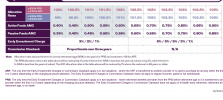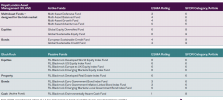Coming late to this discussion on ARF charges.
It is very difficult to ascertain how much ARF holders are being charged, as I discovered when trying to compare my alternative approach to AE with government's current proposals.
For what it's worth, I assumed an average total cost of 1.5% a year for a typical AE retiree (i.e., someone with little or no knowledge of investments and a relatively small pot), made up of 0.9% for administration and asset management, 0.6% for investment advice (see p26 of
this paper). I would appreciate if anyone could advise if I have over- or under-estimated what people are actually being charged (and remember the demographic we're talking about).
As is clear from the discussion on this thread, there's considerable confusion on what the costs are, even when the facts are known.
For clarity, I define the cost as the difference between the return on the underlying assets and the amount credited to the investor's account. Amounts charged outside the ARF must also be included, as should charges levied at the outset, e.g., initial commission (suitably amortised over an appropriate period, which in turn depends on whether funds are being moved between providers).
An example from my own experience shows the scale of the challenge.
Until the end of last year, I was being charged 0.615% a year (0.5% plus VAT) even though I made all the investment decisions. After much effort, I got a 35% reduction, to 0.4% a year (from another provider, with help from an adviser who had to be paid for his efforts - money well spent, I reckon). I'm told that that's about the best available, even for an ARF much bigger than what a typical AE investor would hope to have.
Even at that, there were additional costs. For example, if any of my ARF were invested in a mutual/ pooled fund (e.g., to get exposure to emerging market equities), the charges in that fund would have to be deducted. So too for the cost of buying and selling the underlying assets (which are completely hidden in a unit-linked fund) and margins in exchange rates when converting non-Euro assets to Euros for the purposes of taking an 'income' from the ARF. I've also found that there are all sorts of additional charges for investing in markets outside the 'usual', e.g., even for investing in other EU member states. All those costs must be taken into account.
Because I make my own investment decisions, I don't have a clue of adviser costs, but from what I see on this thread and elsewhere, they can vary enormously and can be either hidden or explicit.
Finally, it's worth remembering that a 1.5% charge on a 4% 'income' means that 37.5% of each withdrawal is disappearing in charges. A sobering thought.

